Diplomatic Bluebook 2018
Chapter 2
Japan's Foreign Policy that Takes a Panoramic Perspective of the World Map
2 Situation in Latin America and the Caribbean Region
(1)Mexico
By promoting a free and open market system through economic reforms, free-trade agreements, and participation in the global value chain, Mexico plays an important role in the international community with its embracing values such as democracy and liberalism. Regarding the issue related to North Korea, Mexico took measures to step up pressure on North Korea issuing “persona non grata” to the “Ambassador” of North Korea. In 2017 Japan and Mexico collaborated on various areas such as the follow-up of the renegotiation of the North American Free Trade Agreement (NAFTA) and an early entry into force of TPP11.
2018 marks the 130th anniversary of the diplomatic relations between Japan and Mexico which has been cherished by the traditional friendship. Mexico has become the region's biggest economic base for Japan; over 1,100 Japanese companies now operate in the country. In 2017, the Foreign Ministers' meeting (July) and the summit (November) provided the two countries with opportunities to strengthen coordination on common agendas. Japan also dispatched the Japan Disaster Relief teams in response to the earthquake in September, whose activities moved Mexican people after being widely publicized in the news and on social media.
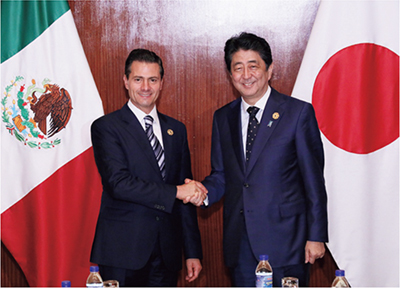 Japan-Mexico Summit Meeting (November 10, Da Nang, Viet Nam; Photo: Cabinet Public Relations Office)
Japan-Mexico Summit Meeting (November 10, Da Nang, Viet Nam; Photo: Cabinet Public Relations Office)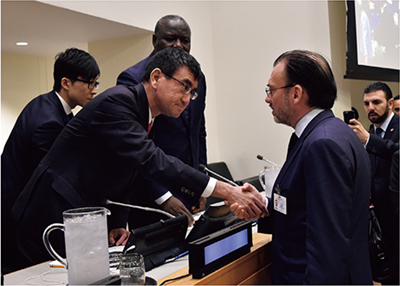 Foreign Minister Kono shaking hands with Secretary of Foreign Affairs Videgaray (September 20, New York)
Foreign Minister Kono shaking hands with Secretary of Foreign Affairs Videgaray (September 20, New York)(2) Central America (El Salvador, Guatemala, Costa Rica, Dominican Republic, Nicaragua, Panama, Belize, and Honduras)
Central America is drawing international attention for its geopolitical importance; located between two oceans and the North and South American continents, and its population of 58 million. Central American countries are currently pursuing economic integration within the region through the Central American Integration System (SICA) as well as the external trade connections. In recent years, democracy is being rooted in this region and stable economic growth is being achieved. However, they still have to tackle with the unstable safety attributable to crimes committed by drug trafficking organizations and youth violent crime organizations (called “MARAS”).
Japan is strengthening relations with Central American countries through SICA, setting its principal policy on development cooperation. Japan continuously holds policy dialogues; such high-level dialogue includes Foreign Ministers' visit to Japan from Panama and Costa Rica (both in September).
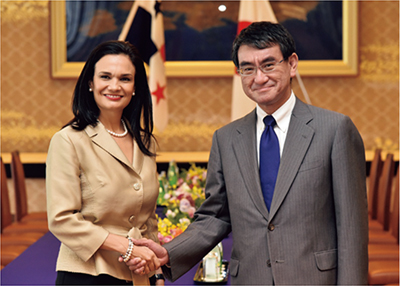 Japan-Panama Foreign Ministers' Meeting (September 1, Tokyo)
Japan-Panama Foreign Ministers' Meeting (September 1, Tokyo)(3) Cuba
In Cuba, on one hand, former President of the Council of State Castro maintained a stable administration, on the other hand, it faces some challenges; Cuba-U.S. relations, and a need to boost foreign investment and develop domestic industries. For the good bilateral relationship, Japan and Cuba have had active high-level exchange in recent years. In addition to a visit to Cuba by State Minister for Foreign Affairs Sonoura in March, Japan-Cuba policy dialogue was held in Tokyo in September.
(4) Brazil
Along with being the top power in Latin America, Brazil has a Nikkei community of approximately 1.9 million, the largest of such community in the world. Because of this, the country has become known as one of the world's most pro-Japanese countries. Brazil has established strong bilateral relations as a Strategic Global Partnership that shares fundamental values with Japan and works with Japan in many areas in the international arena.
While domestic political upheaval, stagnant resource prices, and other factors led to negative economic growth for two consecutive years in 2015 and 2016, Japanese companies continue to have a strong faith in the Brazilian market. Evidence of this is clear from the participation of nearly 130 people in a joint meeting of the Japan-Brazil Economic Cooperation Committees in August, and the holding of a Japan Brazil Meeting for Cooperation on Infrastructure Improvements that same month.
In April, Japan House São Paulo, a new base of information dissemination for Japan, was established with an event attended by VIPs from both countries, including Deputy Prime Minister and Finance Minister Aso, President Temer and Foreign Minister Nunes. Moreover, Japan-Brazil Foreign Ministers' Meeting was held in New York in September. In January 2018, a Consulate-General was opened in Recife.
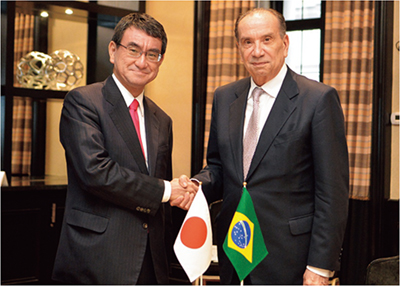 Japan - Brazil Foreign Ministers' Meeting (September 20, New York; Photo: Ministry of Foreign Affairs of Brazil )
Japan - Brazil Foreign Ministers' Meeting (September 20, New York; Photo: Ministry of Foreign Affairs of Brazil )(5) Argentina
The Macri administration, which has conducted liberal and open policies, was recently strengthened by the results of a midterm congressional election held in October 2017, which saw the ruling party advance to being the dominant political force in the country. In terms of relations with Japan, President Macri made a visit to Japan in May that resulted in leaders of both countries expressing an intent to step up collaboration in a range of fields as “strategic partners” that share the fundamental values, as well as to bolster exchange on the occasion of attaining 120 years of diplomatic relations in 2018.
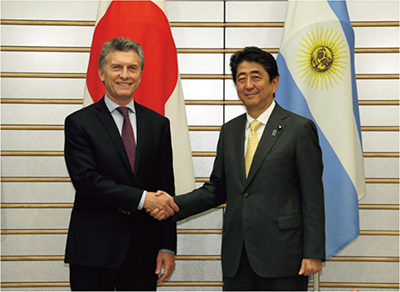 Japan-Argentina Summit Meeting (May 19, Tokyo; Photo: Cabinet Public Relations Office)
Japan-Argentina Summit Meeting (May 19, Tokyo; Photo: Cabinet Public Relations Office)(6) Peru
The Kuczynski administration has practiced liberal economic policies since its inception in July 2016. A resolution to impeach President Kuczynski was submitted to the Peruvian Congress in December 2017 but was rejected. In terms of bilateral relations, VIPs made frequent mutual visits, including a visit to Japan by First Vice President Vizcarra. In November, Summit and Foreign Ministers' Meeting were held to coincide with APEC Viet Nam 2017. Participants confirmed that consistent progress was being made concerning strategic partnerships and that exchange would be further expanded in a wide range of areas in preparation for 2019, dubbed the “Japan-Peru Friendship Year.” Regarding the issues concerning North Korea, Peru has taken measures to increase pressure on North Korea's including by notifying the North Korea's “ambassador” to Peru to leave the country.
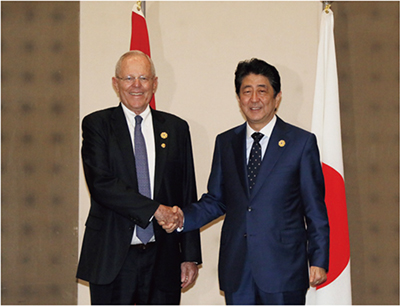 Prime Minister Abe shaking hands with President Kuczynski (November 10, Da Nang, Vietnam; Photo: Cabinet Public Relations Office)
Prime Minister Abe shaking hands with President Kuczynski (November 10, Da Nang, Vietnam; Photo: Cabinet Public Relations Office)(7) Chile
2017 marked 120 years of diplomatic relations between Japan and Chile, and saw frequent mutual high-level visits. Various commemorative events were also held. During a visit to Japan by President Bachelet, in February 2018, the two countries expressed their intent to step up collaboration in various ways both bilaterally and internationally as “strategic partners” that share fundamental values. In domestic affairs, presidential candidate Piñera (a former president) was elected in a runoff to the presidential elections in December, and the new administration began in March 2018.
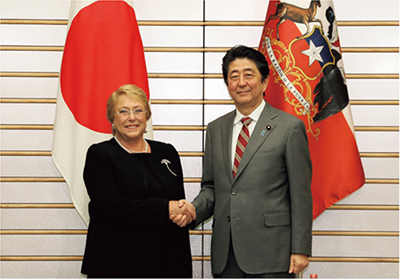 Japan-Chile Summit Meeting (February 23, 2018, Tokyo; Photo: Cabinet Public Relations Office)
Japan-Chile Summit Meeting (February 23, 2018, Tokyo; Photo: Cabinet Public Relations Office)1. 120 Years of History Between Japan and Chile
Chile is located in South America, on the opposite side of the globe from Japan. Japan and Chile established their diplomatic relations through the signing of the Treaty of Amity, Commerce and Navigation in 1897. Japan was the first country in Asia with which Chile established diplomatic relations. The two countries, which share fundamental values, have deepened their friendship in a number of fields over the years.
For Japan, Chile is an important country as a supplier of resources including minerals and foods. For example, Chile is the largest supplier of copper in the world, accounting for a 30% share of world copper production, and the largest supplier to Japan. In recent years, products from Chile, such as salmon, wine, as well as fresh fruits are often found at Japanese supermarkets. Technical cooperation provided by Japan International Cooperation Agency (JICA) starting in the 1970's, has contributed considerably to the development of salmon farming in Chile.
The Easter Island of Chile is famous for statues of moai, and a statue made with rocks from Easter Island was donated to Minamisanriku Town in Miyagi Prefecture. This relationship originally started from the tsunami that reached Minamisanriku Town following the major earthquake in Chile in 1960. Japan and Chile are “neighboring countries” across the Pacific Ocean, and share the common challenge of threats from natural disasters, including earthquakes and tsunami.
2. 120th Anniversary of the Establishment of Diplomatic Relations between Japan and Chile
Japan and Chile celebrated the 120th anniversary of the establishment of their diplomatic relations in 2017.
In Chile, many commemorative events were held with the cooperation of Japanese companies and the Japanese Nikkei communities, including a concert by Tokyo Geidai Philharmonia Orchestra at Teatro Municipal de Santiago. Those cultural events were held with great support from the Japanese Chapter of the Japan-Chile Business Cooperation Committee comprised of private businesses from both Japan and Chile.
The highlight of the 120th anniversary celebration was the visit to Chile by Their Imperial Highnesses Prince and Princess Akishino. At the invitation from the Chilean Government, Their Imperial Highnesses spent time in Chile from September 26 to October 2, with a courtesy call to President Bachelet, and they graced the 120th anniversary Commemoration of the establishment of diplomatic relations between Japan and Chile. A luncheon to welcome Their Imperial Highnesses was hosted by President Bachelet with Chilean government officials and Chileans who were deeply connected to Japan. Their Imperial Highnesses also visited the regions of Valparaiso and Los Lagos, where they were warmly welcomed.
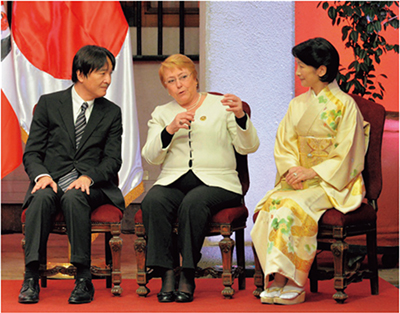 Their Imperial Highnesses Prince and Princess Akishino meeting with President Bachelet at the commemorative ceremony of the 120th Anniversary of diplomatic relations (October 27, Santiago, Chile, Photo: The Asahi Shimbun)
Their Imperial Highnesses Prince and Princess Akishino meeting with President Bachelet at the commemorative ceremony of the 120th Anniversary of diplomatic relations (October 27, Santiago, Chile, Photo: The Asahi Shimbun)The visit by Their Imperial Highnesses Prince and Princess Akishino to Chile marked a new page for exchanges between the two countries and served as an important opportunity to further enhance the existing friendly relationship. It is hoped that based on the strong foundation of trust and friendship between the Governments and people of Japan and Chile, the bilateral relationship in the next 120 years will be further developed.
(8) Uruguay
The Vazquez administration has been actively promoting policies concerning society, education, and hygiene. On the economic front, Japan and Uruguay signed an investment agreement in April 2017. In the international arena, both countries worked closely as non-permanent members of the UN Security Council in 2016 and 2017.
(9) Paraguay
Since the inauguration of President Cartes in 2013, Paraguay has been aiming at the eradication of poverty as a priority of the administration, as well as actively promoting foreign investments. Japan and Paraguay maintain a friendly and cooperative relationship that has been built on economic cooperation and a Nikkei community with approximately 10,000 people.
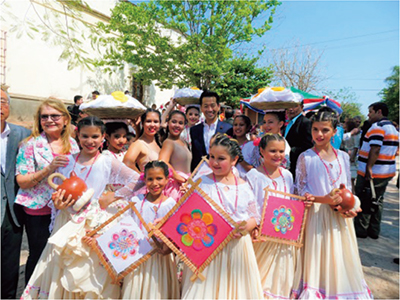 Parliamentary Vice-Minister for Foreign Affairs Okamoto attending the dedication ceremony for the Project for road improvement in Yaguarón through Grant Assistance for Grass-Roots Human Security Project (September 1, Yaguarón, Paraguay)
Parliamentary Vice-Minister for Foreign Affairs Okamoto attending the dedication ceremony for the Project for road improvement in Yaguarón through Grant Assistance for Grass-Roots Human Security Project (September 1, Yaguarón, Paraguay)(10) Colombia
Along with the disarmament of the Revolutionary Armed Forces of Colombia that followed the agreement in the peace negotiations, 2016 saw the beginning of peace negotiations with the National Liberation Army. Progress has since been made in the peace process. In June, Japan and Colombia exchanged notes concerning provision of demining equipment, etc., with Japan agreeing to provide grant aid amounting to 1 billion Japanese yen. To coincide with 110 years of diplomatic relations between the two countries, Colombia plans to open the Center for Japanese Culture, Economics, and Academics in 2018.
(11) Venezuela
Social stability faltered as street demonstrations were widely held in response to the decision by Venezuela's Supreme Court to assume legislative functions in place of the country's legislative body. The results of Constituent Assembly elections in July prompted increased criticism and sanctions against the current administration by the U.S. and other countries. While seeking a return to democracy in Venezuela, Japan continues to provide public welfare support in order to promote human security in the country.
(12) Bolivia
Now in its 11th year, the President Morales administration continues its extended rule. During this time, an abundance of natural resources have led to an average annual growth rate of 5%. With regard to Japan-Bolivia relations, Sports Minister Montano paid a visit to Japan in October, signing a Memorandum of Cooperation in the field of Sports between the Ministry of Sports of the Plurinational State of Bolivia and the Ministry of Education, Culture, Sports, Science and Technology of Japan
(13) Ecuador
The Moreno administration was inaugurated in May. In December, Minister of International Trade Campana made a visit to Japan to brief Japanese leaders on the new administration's economic policies and new investment opportunities in Ecuador. 2018 marks 100 years of diplomatic relations between Japan and Ecuador.
(14) Collaboration with Nikkei Communities
With a Nikkei community of approximately 2.1 million, Latin America has the world's largest Nikkei community outside Japan. The diligent and reliable nature that Nikkei people have consistently demonstrated has won the respect and trust of people in the region and has formed the foundation for the trust that LAC countries place in Japan today.
It has been more than 100 years since Japanese immigration to LAC began. As transitions from one generation to the next among Nikkei communities advance, the generation of young people with little connection to Japan grows in number. At the same time, an increasing number of non-Japanese locals are taking part in Nikkei community activities, giving rise to border-transcending networks of Nikkei people among the new generations.
These circumstances prompted the formation of the “Panel of Experts on Collaborating with Communities of Japanese Immigrants and Descendants (“Nikkei”) in Latin America and the Caribbean,” which issued a report in May.
In line with the basic approach announced by Prime Minister Abe ((1) Nikkei communities are the foundation of the trust felt by Latin America and the Caribbean towards Japan, (2) Strengthening coordination with young Nikkei leaders, and (3) Making Japan into a country that Nikkei people can be proud of) during his visit to LAC in 2014, the report laid out “All-Japan” initiatives and other specific efforts aimed at strengthening coordination between Japan and Nikkei communities in LAC.

